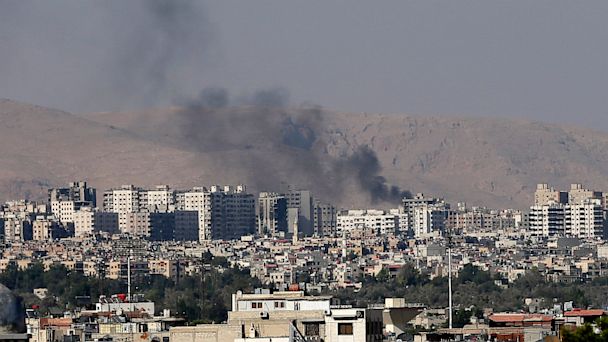Russia Compares Syria War Drums to Iraq Invasion, Warns of Consequences of Intervention
MOSCOW - Russia issued a stark warning today against renewed calls for foreign military intervention in Syria after an alleged chemical weapons attack near Damascus last week.
In a pair of statements, Russia's Foreign Ministry spokesman drew comparisons between the current situation in Syria and the U.S.-led invasion of Iraq and urged countries "not to repeat the mistakes of the past." Responding directly to comments by Secretary of Defense Chuck Hagel about military contingency planning, Alexander Lukashevich said such remarks were "alarming."
Lukashevich reiterated Russia's position that evidence the Syrian military was responsible for the suspected chemical attack was pre-fabricated in order to frame the government.
He said statements by the United States, France, and Britain that blame government forces are "completely ignoring many facts pointing to the fact that this action as a provocation of the irreconcilable opposition."

(Hassan Ammar/AP Photo)
The situation "brings to mind the events of 10 years ago, when, on the pretext of false information about the Iraqi possession of weapons of mass destruction, the United States outside the U.N. went on an adventure, the consequences of which are well known," Lukashevich said.
The statement also warned foreign intervention in Syria "will lead to its further escalation and the most devastating impact on the already volatile situation in the Middle East."
In an earlier statement, Russia also took credit for the Syrian government agreeing to allow UN inspectors to visit the site of the latest alleged chemical weapons attack outside Damascus.
"This is, in our view, an opportunity for a thorough, impartial and objective investigation of all the circumstances of what happened," the statement in Lukashevich's name said.
It goes on to urge the armed opposition to allow the UN inspectors safe passage and warns countries not to use the attack as justification for "military action in Syria."
While Secretary of State John Kerry has been furiously working the phones on Syria, his Russian counterpart Foreign Minister Sergei Lavrov has been doing so as well. Since Thursday he has spoken to Kerry as well as his counterparts from the UK, France, Germany, Italy, and EU Foreign Policy chief Catherine Ashton.
The White House has spent much of the weekend deliberating how to proceed, now that, as a senior administration official told ABC News, it has determined there is " very little doubt" that the Assad regime is responsible for the alleged chemical attack.
Read: Red Line Crossed? Syria in Focus at White House Meeting
"Based on the reported number of victims, reported symptoms of those who were killed or injured, witness accounts, and other facts, there is very little doubt at this point that a chemical weapon was used by the Syrian regime against civilians in this incident," the official said. "We are continuing to assess the facts so the president can make an informed decision about how to respond to this indiscriminate use of chemical weapons."
White House officials also point out the attack was on rebel-held territory and apparently done using rockets that the rebels do not possess.
The president has ordered his national security team to draw up possible strike options on Syria, but there is a divide in the White House on how forcefully to respond, although another official told ABC News if there is a strike, it must be "timely" - done soon enough to prevent another chemical attack.
However, the White House does not want to act alone. U.S. officials are back channeling through the United Nations to see if Russia could be convinced to agree to a resolution.
If there is no UN authorization, the United States would lead any possible strike, but, a senior official told ABC News "we do not want to do anything on our own." U.S. allies must commit both "resources" and "political will" the official said.
ABC News' Jonathan Karl contributed to this report.